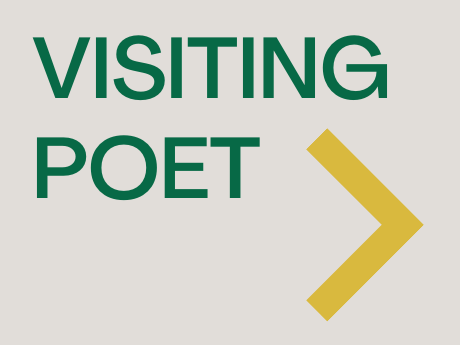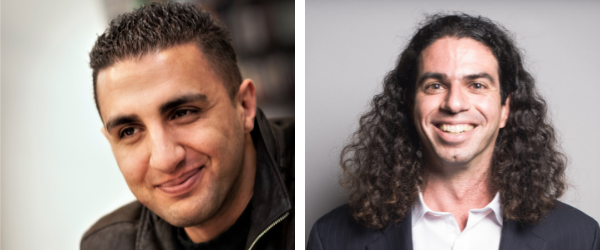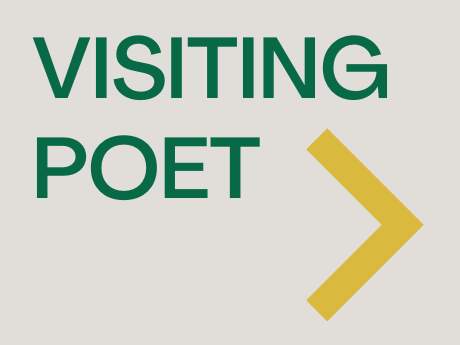Visiting Poet
Visiting Poet: Kareem James Abu-Zeid on Najwan Darwish

Three Poems
Nothing More to Lose
Lay your head on my chest and listen
to the layers of ruins
behind the madrasah of Saladin
hear the houses sliced open
in the village of Lifta
hear the wrecked mill, the lessons and reading
on the mosque’s ground floor
hear the balcony lights
go out for the very last time
on the heights of Wadi Salib
hear the crowds drag their feet
and hear them returning
hear the bodies as they’re thrown, listen
to their breathing on the bed
of the Sea of Galilee
listen like a fish
in a lake guarded by an angel
hear the tales of the villagers, embroidered
like kaffiyehs in the poems
hear the singers growing old
hear their ageless voices
hear the women of Nazareth
as they cross the meadow
hear the camel driver
who never stops tormenting me
Hear it
and let us, together, remember
then let us, together, forget
all that we have heard
Lay your head on my chest:
I’m listening to the dirt
I’m listening to the grass
as it splits through my skin…
We lost our heads in love
and have nothing more to lose
Mount Carmel
Though you’re right beside it
you can’t call out to the sea:
Neighbor, come join me for a coffee.
Instead, and without my permission,
my other neighbor, Carmel,
visits me through the window,
never trying to enter by the door.
(It owns the place, at any rate.)
Sometimes the church bells reach me
from the depths of Wadi Nisnas;
and some mornings the call to prayer
comes in quietly from the Istiqlal Mosque (borne
on an ancient breeze from Wadi Salib);
and the Baha’is keep giving alms
and filling the city with Persian gardens
that escaped from Shiraz;
and in Kababir
the followers of Mirza Ghulam Ahmad
maintain their naps of devotion
and hunt for Truth in the Prophet’s words;
as for the holy men among the Druze,
their poems reach me from the temple
at the foot of Mount Hermon
like the white headscarves of their women
(the ones that hide a thousand years of darkness).
And I, aimless
between the mountain and the sea,
I who follow no one but myself—
what am I doing among all these devotees
here
where time has found its end?
Jerusalem (II)
When I leave you I turn to stone
and when I come back I turn to stone
I name you Medusa
I name you the older sister of Sodom and Gomorrah
you the baptismal basin that burned Rome
The murdered hum their poems on the hills
and the rebels reproach the tellers of their stories
while I leave the sea behind and come back
to you, come back
by this small river that flows in your despair
I hear the reciters of the Quran and the shrouders of corpses
I hear the dust of the condolers
I am not yet thirty, but you buried me, time and again
and each time, for your sake
I emerge from the earth
So let those who sing your praises go to hell
those who sell souvenirs of your pain
all those who are standing with me, now, in the picture
I name you Medusa
I name you the older sister of Sodom and Gomorrah
you the baptismal basin that still burns
When I leave you I turn to stone
When I come back I turn to stone
Translated from the Arabic by Kareem James Abu-Zeid.
Poems originally appeared in Exhausted on the Cross (NYRB Poets, 2021) and Nothing More to Lose (NYRB Poets, 2014). Reprinted with permission of the translator.
I was first introduced to the remarkable poetry of Najwan Darwish back in 2009 by a mutual friend, the late Jack Hirschman, a legend of the Beat generation and the former poet laureate of San Francisco. Jack had invited Najwan to the second biennial San Francisco International Poetry Festival, which he was organizing at the time, and he asked me to translate some of Najwan’s poetry. Najwan’s US visa was held up, then delayed again, and was finally approved—after Jack sent an angry letter to the US State Department—but too late for Najwan to attend the festival. I wound up reading his poems for him there, both in Arabic and in my English translations.
In translating Najwan’s work for the festival, I was struck by the raw power of the poems, but also by their remarkable range. There’s a tendency to expect that any Palestinian literature will, of necessity, be driven primarily by political considerations, but I quickly discovered that this was not the case here. The political is there, to be sure, but the core impulses behind Najwan’s poetry are not political per se, but rather aesthetic, emotional, and spiritual. A quiet, subtle spirituality pervades this poetry, not one of satori-like explosions, but rather a spirituality infused by compassion on the one hand, and by outrage at the injustices of the world on the other (and not only the endless injustice that is the occupation of Palestine). A sense of timelessness pervades much of his work, often accompanied by an inexplicable feeling of loss.
As a poet and a person, Najwan is both Palestinian and (to use a hackneyed expression) a citizen of the world, a truly peripatetic soul. The importance of place cannot be overstated in Najwan’s poetry, and he expresses deep, visceral connections to the many places he has lived and experienced first-hand. There are collections centered on London (where Najwan lived for almost a year), Akka (better known in English as Acre), Granada, and a series of poems centered on Kadiköy (a district on the Asian side of Istanbul where Najwan has spent quite a bit of time recently), with the fifth-century Council of Chalcedon serving as its backdrop.
Najwan’s native cities of Jerusalem and Haifa are the two that appear the most frequently in his poetry, and his relations to both are complex and varied. While Haifa is frequently personified by the welcoming sea and the timeless Mount Carmel watching over it, Jerusalem often appears as a cruel mistress-mother (city names are grammatically feminine in Arabic), willing to sacrifice—and even crucify—her own children. But the horizontal dimension of place is accompanied by an equally rich vertical dimension of time in this poetry, a historical richness that is rare among poets writing in the 21st century. Najwan is very much a student not only of poetry, but also of history. Often, centuries or even millennia of history well up within his texts, serving both to enrich and complicate the present moment. As a poet, Najwan seems to inhabit the present and past simultaneously. But this is always natural, personal—never some kind of grandiose literary device.
Once, when we were doing an event together, a member of the audience asked Najwan about Jerusalem, and the Christian imagery that appears in some of his work. Najwan replied that Jesus, for him, was a kid from his neighborhood, someone he could almost still see, sometimes, walking through the alleyways when he looked out his window. The city, he seemed to be implying, has never been kind to its children.

Born in Jerusalem in 1978, Najwan Darwish is a Palestinian poet who writes in Arabic. His work has been translated into over 20 languages, and his 2014 book Nothing More to Lose was listed as one of best books of the year by US National Public Radio. His 2021 book Exhausted on the Cross was a finalist for the PEN Award for Poetry in Translation. The New York Review of Books has described him as "one of the foremost Arabic-language poets of his generation." Among other prominent positions in cultural journalism, Darwish has been the Head of the Cultural Section of the Al Araby Al Jadeed pan-arab newspaper since its establishment in 2014 in London, and he serves as the literary advisor to the Palestine Festival of Literature.
Kareem James Abu-Zeid, PhD, is a translator of authors from across the Arab world who translates from Arabic, French, and German. His work has earned him an NEA translation grant, PEN Center USA’s Translation Award, Poetry magazine’s translation prize, residencies from the Lannan Foundation and the Banff Centre, a Fulbright Fellowship (Germany), and a CASA Fellowship (Egypt), among other honors. His most recent translation is Najwan Darwish’s Exhausted on the Cross (NYRB Poets, 2021). He is also the author of The Poetics of Adonis and Yves Bonnefoy: Poetry as Spiritual Practice.

